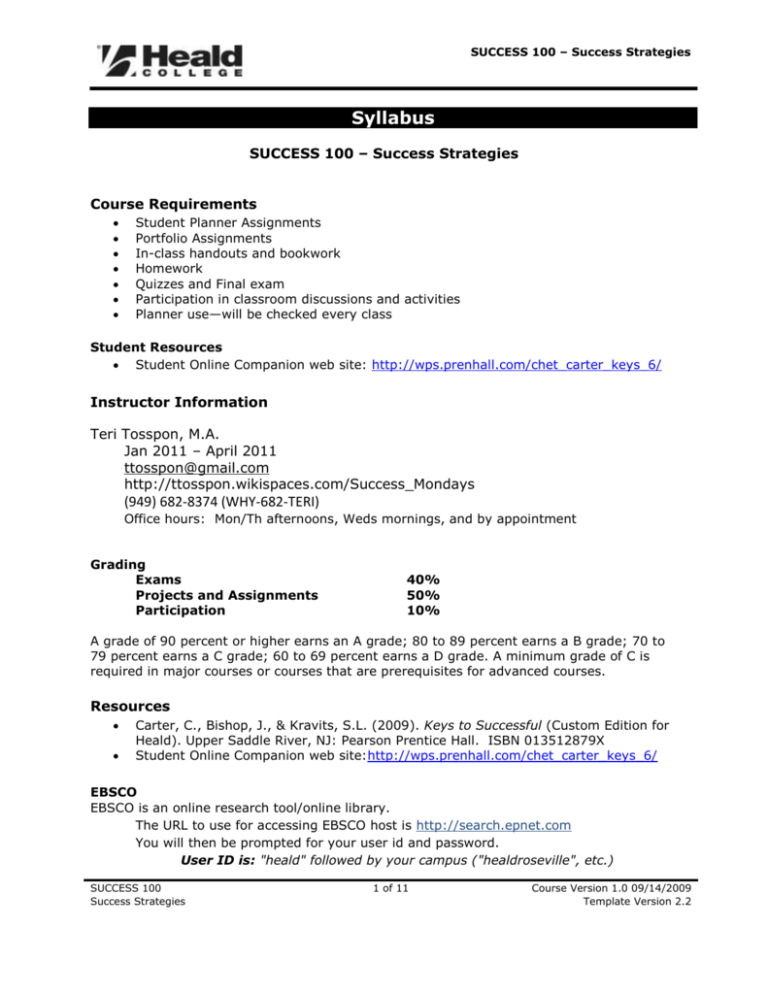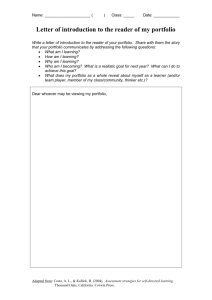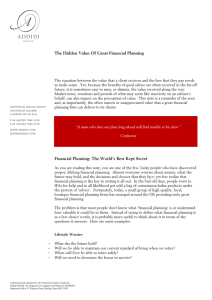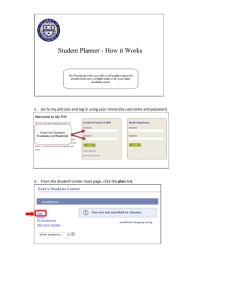
SUCCESS 100 – Success Strategies
Syllabus
SUCCESS 100 – Success Strategies
Course Requirements
Student Planner Assignments
Portfolio Assignments
In-class handouts and bookwork
Homework
Quizzes and Final exam
Participation in classroom discussions and activities
Planner use—will be checked every class
Student Resources
Student Online Companion web site: http://wps.prenhall.com/chet_carter_keys_6/
Instructor Information
Teri Tosspon, M.A.
Jan 2011 – April 2011
ttosspon@gmail.com
http://ttosspon.wikispaces.com/Success_Mondays
(949) 682-8374 (WHY-682-TERI)
Office hours: Mon/Th afternoons, Weds mornings, and by appointment
Grading
Exams
Projects and Assignments
Participation
40%
50%
10%
A grade of 90 percent or higher earns an A grade; 80 to 89 percent earns a B grade; 70 to
79 percent earns a C grade; 60 to 69 percent earns a D grade. A minimum grade of C is
required in major courses or courses that are prerequisites for advanced courses.
Resources
Carter, C., Bishop, J., & Kravits, S.L. (2009). Keys to Successful (Custom Edition for
Heald). Upper Saddle River, NJ: Pearson Prentice Hall. ISBN 013512879X
Student Online Companion web site:http://wps.prenhall.com/chet_carter_keys_6/
EBSCO
EBSCO is an online research tool/online library.
The URL to use for accessing EBSCO host is http://search.epnet.com
You will then be prompted for your user id and password.
User ID is: "heald" followed by your campus ("healdroseville", etc.)
SUCCESS 100
Success Strategies
1 of 11
Course Version 1.0 09/14/2009
Template Version 2.2
SUCCESS 100 – Success Strategies
Password is: "student"
(For more information about EBSCO contact your campus LRC manager)
Instructor’s Biography
Teri Lynn Tosspon grew up on a farm in the middle of Nebraska. Daughter of a
farmer and an elementary school teacher, she fell in love with books, language, and
literature. After a study-abroad program at Oxford University (Mansfield College), Teri
acquired two masters degrees: in English from the University of Nebraska and in History
from University of California Irvine. She is the only member of her family to leave the state
of Nebraska. Her research interests were in the cultural influences of North Africa on earlymodern (15th – 18th Century) England. Teri Tosspon has given lectures on this topic at
conferences around the country and has had pieces of creative writing published. In her free
time, she writes, manages websites, bakes and paints. Former students have said that she
is “very funny, relaxed and passionate about her job.” Heald provides Teri with an
opportunity to directly assist students in a caring, compassionate environment. Teri can be
reached at ttosspon@gmail.com or via phone at (949) 981-6769.
Heald Policy Reminders
Heald College policies can be found in the Heald Academic Catalog. Please review the
reminders below and, if needed, refer to the Academic Catalog for complete policy details.
Attendance
Policies and standards at Heald College prepare graduates to meet the demands of
future employers. Attendance is considered in the evaluation of each student’s
performance when making recommendations to employers.
Students are required to attend all classes and are expected to be ready for class at the
scheduled time. Students who are tardy or leave early may miss graded events that will
negatively impact their overall course grade.
A record of attending at least 85% of the scheduled class meetings generally supports
student success academically and in the work place. Students are encouraged to monitor
their attendance by using the following table to maintain at least 85% attendance
Students who exceed the absence limits specified in the 85% attendance guidelines
listed above will not be admitted to class without following the procedures indicated in
the Heald Academic Catalog.
Heald College has set 70 percent as the minimum attendance standard for a student to
continue to be enrolled in a course. Using 70 percent as a guideline, students will be
withdrawn from any course when their absences exceed those in the 70% Attendance
table.
A student who is absent 14 or more consecutive calendar days in a course will be
withdrawn from the course. This means that missing two classes in a row will lead to
your being dropped from the course—don’t let this happen!
SUCCESS 100
Success Strategies
2 of 11
Course Version 1.0 09/14/2009
Template Version 2.2
SUCCESS 100 – Success Strategies
Makeup Policy
Each student has the opportunity to make up one missed major in-class graded event.
Your instructor will inform you of which graded events fall into this category in this
course.
Professional Appearance
At Heald College, student professional appearance standards have been established to
be at or above those normally required for employment in business, industry, and
healthcare in the area. The dress standard helps prepare a student for the workplace
and fosters a professional appearance, which is a positive factor in job placement. The
professional appearance policy is discussed in the enrollment process and is available in
the Academic Affairs office.
Instructor’s Classroom Policies
Homework and Class work
All homework is due on the due date at the beginning of the class period. No late
homework will be accepted under any circumstances.
All class work must be done in class and turned in that day and at the time specified.
If you are absent or tardy or leave class, you cannot make up the class work
(including quizzes) that you missed.
Your name should be on all of your work. Nameless work will not be graded.
How to get an “A” in this class:
Show up on time to each class. Do not miss class, come tardy, or leave early.
Be prepared for each class with your homework and studying done.
Follow the directions and be mindful of the grading rubric for each assignment.
Pay attention to your syllabus. All homework and quizzes are listed in the syllabus.
Work hard—make a true effort with your homework and class work.
Participate in class discussions and activities.
Be diligent, responsible, and a good citizen of the class. (This means being respectful
of everyone, including yourself. Put away your cell phone. Put away your food.)
If you are experiencing some issue that is interfering with your ability to perform at your
best in this class, please contact me and let me know. I am here to help you, and I can
do a better job of that if you keep me informed of what’s going on with you.
Get your work done early. Waiting until the last minute may mean not having your work
done because of unforeseen problems with computers, printers, etc.
Instructor Errors – I am human and will, therefore, make mistakes from time to time. If
you feel that I have made an error on grading, or failed to input the grade into the Online
Gradebook (myportal.heald.edu), then please write a note on the assignment in question
and place it back into the “Turn In Here” folder.
If I make an error on a power point, please let me know in a polite way (perhaps at a class
break).
SUCCESS 100
Success Strategies
3 of 11
Course Version 1.0 09/14/2009
Template Version 2.2
SUCCESS 100 – Success Strategies
Note: we have 3-4 graded activities PER CLASS PERIOD. Reader response (10
points), Quiz (10-20 points), Peer Planner Check (10 points), and one (or more)
chapter-specific assignment. You also have weekly Planner and Portfolios due.
Week 1 Jan 17
Martin Luther King Jr Holiday
In Class Activities
None- HOLIDAY
Week 2
Jan 24
Topics
Syllabus
In Class Activities
Reader response 1
Course
Requirements
Who Can Help You? (handout)
Assess Yourself as an Analytical Thinker (page 12)
Assess Yourself as an Creative Thinker (page 18)
Assess Yourself as an Practical Thinker (page 24)
Chapter 1 Welcome
to College
Homework (due next meeting): Quick start to college (xxix-xxxviii) Chapter 1
Planner 1: Record class times, class prep times, study times, and commute times. Write
down academic due dates for projects, papers, tests, and presentations. Write a oneparagraph reflection on how this may help you in school and on the job.
Portfolio 1: Setting Career Goals (pg 29)
Week 3
Jan 31
Topics
Chapter 2
Values, Goals and
Time: Managing
Yourself (p. 33-62)
Skill: Knowing
learning styles
Chapter 3 Learning
How You Learn:
Making the Most of
Your Abilities (p. 6594)
Skill: Setting goals
managing stress
SUCCESS 100
Success Strategies
In Class Activities
Reader response 2 & 3
Explore your Values (p. 37)
Map out a Personal Goal (p. 41)
Procrastination: strategies for overcoming common reasons
people procrastinate (p. 51)
Multiple Pathways to Learning (p. 72),
scoring grid (p. 73)
The Personality Spectrum (p. 76),
scoring diagram (p. 77)
Chapter 1 Quiz:
1. What are the 3 parts of successful intelligence and how can I
build “intelligence”?
2. How do fears and self-perceptions affect esteem, motivation,
and learning?
4 of 11
Course Version 1.0 09/14/2009
Template Version 2.2
SUCCESS 100 – Success Strategies
Homework (due next meeting): Time tracker, Read Chapter 2, Read Chapter 3
Planner 2: Identify times when you procrastinated on an activity. Write a paragraph
reflecting on how this can help you to monitor your priorities, evaluate your academic and
career goals, and improve personal performance.
Portfolio 2- Plans for Success: Career Goals – Knowledge and Skills (pg 61)
Portfolio 3- Self-Portrait Think Link (pg 92)
Week 4
Feb 7
Topics
In Class Activities
Chapter 4
Critical, Creative,
and Practical
Thinking: solving
Problems and
Making Decisions (p.
101-131)
Reader Response 4
Analyze a Statement (p. 110) Fact or opinion?
Take a Practical Approach to Building Successful Intelligence
Skills (p. 119).
Using Successful Intelligence to Solve Problems and Make
Decisions (p. 120)
Problem-Solving Flowchart (p. 129)
Chapter 2 Quiz
1. How do your goals reflect your values?
2. What are examples of good time management strategies?
Chapter 3 quiz
1. What are the two assessments in this chapter and how are
they different?
3. How can you manage a learning disability?
Homework (due next meeting): Read Chapter 4
Skill: Managing
time
Planner 3: Research and create a list of questions you would like to ask a person working
in a job you wish to have in the future. Think about benefits (healthcare, vacations), job
duties, what is the most difficult part of the job, etc.
Portfolio 4- Generating Ideas for Internships (pg 130)
Week 5
Feb 14
Topics
Chapter 5 Reading
and Studying:
Focusing on Content
(p. 135-168)
In Class Activities
Reader response 5
SQ3R: survey, question, read, recite, review (p. 147-156)
Study Skills for How You Learn (Dominant Intelligence)
Responding Critically (p. 156-157)
Skill: Reading
Chapter 4 Quiz:
1. Name one way to improve your analytical, one way to
improve your creative, and one way to improve your practical
thinking.
2. How do you decide if something is fact or opinion?
SUCCESS 100
Success Strategies
5 of 11
Course Version 1.0 09/14/2009
Template Version 2.2
SUCCESS 100 – Success Strategies
Homework (due next meeting): Read Chapter 5
Planner 4: Note times when you stopped listening or “tuned out” and describe what you
experienced at these moments. Write a paragraph reflecting on how distractions in and out
of the classroom might cause your difficulty concentrating and interfere with effective
listening. What techniques might you use to deal with distractions and become a stronger
and more active listener?
Portfolio 5- Reading Skills on the Job (pg 168)
Week 6 Feb 21
In Class Activities
No Class
Week 7
President’s day, no class
Feb 28
Topics
Chapter 6 Listening,
Note Taking, and
Memory (p. 171206)
In Class Activities
Reader Response 6
Discover Yourself as a Listener (p. 178)
Face a Note-Taking Challenge (p. 186)
Learn from your mistakes (p. 233)
Chapter 5 Quiz (10 points):
1. Define and explain the aspects of SQ3R.
2. What does it mean to respond critically to what you read?
Homework (due next meeting):
Skills: Note taking
Planner 5: Record two times when you used stress-reducing strategies, especially times
related to test anxiety. Provide details and specifics. Write a paragraph reflecting on how
employing stress-reducing strategies may help you perform better in school and on the job.
Portfolio 6- Learning more about career success (pg 205)
Week 8
Mar 07
Topics
Chapter 7 Test
Taking(p. 209-239)
Chapter 8 Researching
and Writing (p. 242-273)
In Class Activities
Reader Response 7
Google (Yes, It’s a Verb) (p. 251)
Revise and Edit with the Help of a Checklist (p. 265)
Quiz on chapter (10 points):
How would you describe the 3 most common note-taking
systems?
Skill: Writing
Homework (due next meeting): Read Chapter 6
Planner 6: Record how much time you spend on the Internet for school-related activities
and non-school related activities. How much time do you spend on each? Write a paragraph
reflecting on how a time-log helps you analyze and prioritize the amount of time you spend
SUCCESS 100
Success Strategies
6 of 11
Course Version 1.0 09/14/2009
Template Version 2.2
SUCCESS 100 – Success Strategies
on important versus non-important activities. Also, how do online school-related activities
improve literacy skills and advance your professional development?
Portfolio 7- On-the-Job Testing (pg 238)
Portfolio 8- A Job Interview Cover Letter (pg 272)
Week 9
Mar 14
Topics
Chapter 9 Relating to
Others (p. 282-308)
In Class Activities
Reader Response 8
Skill: Building
Successful
Relationships
Expand your Perception of Diversity (p. 286)
Give Constructive Criticism (p. 293)
Chapter 7-8 Quiz (10 points)
1. Define several strategies for test success.
2. Define and explain the aspects of the CARS test.
3. Define and explain the steps of the writing process.
Homework (due next meeting): Chapter 8
Planner 7: Record the number of times that unpredictable and unexpected expenses come
up. Write a paragraph reflecting on how tracking expenses might help you determine your
financial needs, allocate your money effectively, and develop a budget plan at school and
throughout your professional career.
Portfolio 9- Compiling a Resume (pg 306)
Week 10-
Mar 21
Topics
Chapter 10
Wellness (p.
312-340)
Chapter 11
Managing Money
and Career (p.
346-377)
In Class Activities
Reader Response 9
Use the Holmes-Rahe scale (p. 314)
Evaluate Your Substance Use (p. 329)
Map Out Your Budget (p. 358)
Chapter 9 Quiz (10 points)
1. What is “cultural competence” and how can you improve yours?
2. Define and explain methods for each of the following: giving and
receiving criticism, managing conflict, and managing anger.
Skills: managing
money
Homework (due next meeting): Chapter 9
Planner 8: No Planner
Portfolio 10- Wellness at Work (pg 340)
Portfolio 11- Be Specific About Your Job Needs (pg 377)
SUCCESS 100
Success Strategies
7 of 11
Course Version 1.0 09/14/2009
Template Version 2.2
SUCCESS 100 – Success Strategies
Week 11 Mar 30
In Class Activities
Class 11 is on Mar 30, 2011 and is dedicated to our
final. See below for information about the final.
Portfolio
Student Learning Outcomes
The purpose of this assignment is to allow you to demonstrate mastery of the following
course level outcome:
Prepare a Career Plan
Assignment Description
The Portfolio project gives you practical experience building a portfolio. This is a tool
that can help you identify your personal strengths, set realistic career goals, develop
a resume, and engage in other activities that will support your personal and
professional success.
This project consists of twelve written activities that you will complete throughout
the quarter. Your instructor will review these along the way and will then assess
them as a whole at the end of the course. Your instructor will share the rubric that
will be used to assess the project.
You will complete each of the following twelve activities during the quarter:
o
o
o
o
o
o
o
o
o
o
o
o
Portfolio
Portfolio
(pg 61)
Portfolio
Portfolio
Portfolio
Portfolio
Portfolio
Portfolio
Portfolio
Portfolio
Portfolio
Portfolio
Activity #1- Setting Career Goals (pg 29)
Activity #2- Plans for Success: Career Goals – Knowledge and Skills
Activity
Activity
Activity
Activity
Activity
Activity
Activity
Activity
Activity
Activity
#3- Self-Portrait Think Link (pg 92)
#4- Generating Ideas for Internships (pg 130)
#5- Reading Skills on the Job (pg 168)
#6- Learning more about career success (pg 205)
#7- On-the-Job Testing (pg 238)
#8- A Job Interview Cover Letter (pg 272)
#9- Compiling a Resume (pg 306)
#10- Wellness at Work (pg 340)
#11- Be Specific About Your Job Needs (pg 377)
#12- Revisit Your Successful Intelligence (pg 399)
Each activity is worth 10 points. Each activity should be complete and easy to read.
Professional language should be used at all times.
SUCCESS 100
Success Strategies
8 of 11
Course Version 1.0 09/14/2009
Template Version 2.2
SUCCESS 100 – Success Strategies
Student Planner Assignments
Student Learning Outcomes
The purpose of this assignment is to allow you to demonstrate mastery of the following
course level outcomes:
Demonstrate communication, time management, critical thinking, study skills, and
literacy skills that support academic and professional success
Recognize the benefits of self-motivation, self-management, and personal
responsibility on career planning and development
Explain the relationship between physical health, psychological well being, and
healthy lifestyles to personal growth and development
Assignment Description:
The Student Planner assignment is intended to assist you with short- and long-term
planning, time management, self-management, and transferable skills applicable to
personal and professional lifetime goals. In the process, you will learn how to use
your Planner, which is a tool that you can use in multiple ways at school, on the job,
and at home.
Each week you must write your schedule/assignments/events in your planner
(graded in class) AND turn in a paragraph based on your weekly assignment:
Planner 1: Record class times, class prep times, study times, and commute times. Write
down academic due dates for projects, papers, tests, and presentations. Write a oneparagraph reflection on how this may help you in school and on the job.
Planner 2: Record times you pay yourself a compliment or give yourself a positive
evaluation. Write a one-paragraph reflection on how this may help you strengthen your
self-confidence and motivate you in school and in your career.
Planner 3: Identify times when you procrastinated on an activity. Write a paragraph
reflecting on how this can may help you to monitor your priorities, evaluate your
academic and career goals, and improve personal performance.
Planner 4: Schedule appointments with three people you will interview about their fields
and professions. Write a paragraph reflecting on how this may help you manage and
prioritize your time, as well as how it may help you achieve short- and long-term goals.
Planner 5: Record five new words you learned during the week, including the definition
and etymology of each. Write a paragraph reflecting on how you found out the
definitions and etymologies. Where did you do for this information? How might this help
you in school and on the job?
SUCCESS 100
Success Strategies
9 of 11
Course Version 1.0 09/14/2009
Template Version 2.2
SUCCESS 100 – Success Strategies
Planner 6: Note times when you stopped listening or “tuned out” and describe what you
experienced at these moments. Write a paragraph reflecting on how distractions in and
out of the classroom might cause your difficulty concentrating and interfere with
effective listening. What techniques might you use to deal with distractions and
become a stronger and more active listener?
Planner 7: Record two times when you used stress-reducing strategies, especially times
related to test anxiety. Provide details and specifics. Write a paragraph reflecting on
how employing stress-reducing strategies may help you perform better in school and on
the job.
Planner 8: Record how much time you spend on the Internet for school-related activities
and non-school related activities. How much time do you spend on each? Write a
paragraph reflecting on how a time-log helps you analyze and prioritize the amount of
time you spend on important versus non-important activities. Also, how do online
school-related activities improve literacy skills and advance your professional
development?
Planner 9:
None!
Planner 10: Record the number of times that unpredictable and unexpected expenses
come up. Write a paragraph reflecting on how tracking expenses might help you
determine your financial needs, allocate your money effectively, and develop a budget
plan at school and throughout your professional career.
SUCCESS 100
Success Strategies
10 of 11
Course Version 1.0 09/14/2009
Template Version 2.2
SUCCESS 100 – Success Strategies
Success Final
Success 100 Final
Scoring Rubric for Success 100
Final
Prepare an oral presentation on the four questions found
below. Provide me with either an outline or a printout of your
Power Point Presentation with your oral presentation.
Professional presentation:20 points possible
_____/4 Eye contact
_____/4 Voice modulation (volume, speed)
_____/4 Posture and body language
_____/4 Word choice and Fluency
_____/4 Enthusiasm and Credibility
Question 1. Choose one thing that you learned in this class
and specifically address it. What did you learn in this class?
Question 1: 20 points possible
_____/10 Completeness
_____/ 10 Specificity
Question 2. About that “one thing” you learned (discussed in
question 1): when doing it, how do you use (or plan to us)
Question 2: 20 points possible
_____/4 Analytical
_____/4 Creative
Analytical thinking?
Creative thinking?
Practical thinking?
_____/4 Practical
_____/4 Completeness
_____/4 Specificity
Question 3. How do YOU help your community?
How can you help others?
How can you get involved locally and nationally?
How can you help to preserve the environment?
Question 3: 20 points possible
_____/4 Helping others
_____/4 Getting involved locally and nationally
_____/4 Helping to preserve the environment
_____/4 Completeness
_____/4 Specificity
Question 4. What is your personal mission statement? How
does it reflect your:
_____/4 Your character
_____/4 Your contributions
Character
Contributions
Achievements
Goals
Values
SUCCESS 100
Success Strategies
Question 4: 20 points possible
_____/4 Your achievements
_____/4 Your goals
_____/4 Your values
11 of 11
Course Version 1.0 09/14/2009
Template Version 2.2







